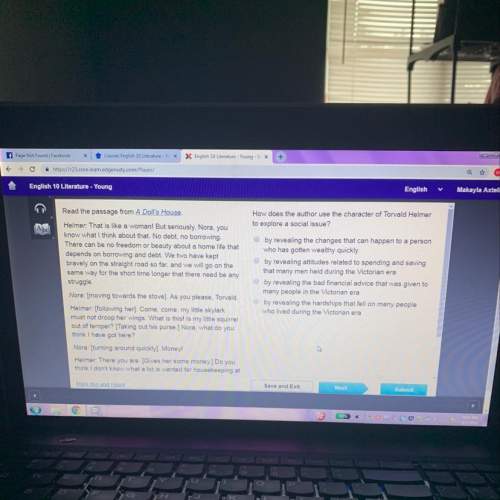

Answers: 1
Other questions on the subject: English

English, 21.06.2019 18:50, karlacr5117
It's to know your purpose before you read something because a purpose can:
Answers: 1

English, 21.06.2019 23:10, raylener5841
What is the meaning of each underlined word in these excerpts from "a modest proposal" by jonathan swift? i think it is agreed by all parties, that this prodigious number of children in the arms, or on the backs, or at the heels of their mothers, and frequently of their fathers, is in the present deplorable state of the kingdom, a very great additional grievance; and therefore whoever could find out a fair, cheap and easy method of making these children sound and useful members of the common-wealth, would deserve so well of the publick, as to have his statue set up for a preserver of the nation. some persons of a desponding spirit are in great concern about that vast number of poor people, who are aged, diseased, or maimed; and i have been desired to employ my thoughts what course may be taken, to ease the nation of so grievous an incumbrance. the word prodigious means . the word desponding means .
Answers: 1

English, 21.06.2019 23:30, garciagang0630
With this 3 questions ! really need them right! 1. the first continental congress met in philadelphia on september 5, 1774. all of the colonies sent representatives except georgia. this congress continued in session until october 26, 1774. by then it had passed resolutions calling for a boycott against british trade. the author's main purpose was a. to inform b. to persuade c. to instruct d. to give an opinion 2. identify the point of view of each of the following passages. "my second mate was a round-cheeked, silent young man, grave beyond his years, i thought; but as our eyes happened to meet i detected a slight quiver on his lips. i looked down at once. it was not my part to encourage sneering on board my ship. it must be said, too, that i knew very little of my officers." (joseph conrad, "the secret sharer") a. first person b. third person limited c. third person omniscient d. none of the above 3. identify the point of view of each of the following passages. "he had only himself to in his choice: his fortune was his own; for as to frank, it was more than being tacitly brought up as his uncle's heir, it had become so avowed an adoption as to have him assume the name of churchill on coming of age. it was most unlikely, therefore, that he should ever want his father's assistance. his father had no apprehension of it." (jane austen, emma) a. third person omniscient b. third person limited c. first person d. none of the above
Answers: 1

English, 22.06.2019 01:00, pchisholm100
Read the passage first of all if someone says your dream is impossible, they’re wrong. you can’t prove that something is impossible-all you know is that[it] hasn’t been done yet. people said no one could scale mount everest but in 1953, sir edmund hilary and tenzing norway gazed down upon the world from it’s summit. people said that man could not fly, but in 1903, orville and wilbur wright made the first sustained powered flight in a heavier-than-air machine. people said, “okay, we admit that someone could climb mount everest, and we admit that man has learned to fly, but no one will ever, ever walk on the face of the moon.” if we can send three men a quarter of a million miles away and bring them home safely, is there any great task we cannot accomplish? which identifies the textual evidence that best supports the claim: the authors purpose is to persuade? a: the author shares historical information about the wright brothers. b: the author states that men have walked the moon. c: the author states that others who think your dreams are impossible are wrong. d: the author wants to know what tasks we cannot accomplish.
Answers: 1
Do you know the correct answer?
Which word in the sentence is the direct object? this explains the discovery of the ruins. a. disco...
Questions in other subjects:


History, 08.04.2020 18:49





English, 08.04.2020 18:49



Mathematics, 08.04.2020 18:49







